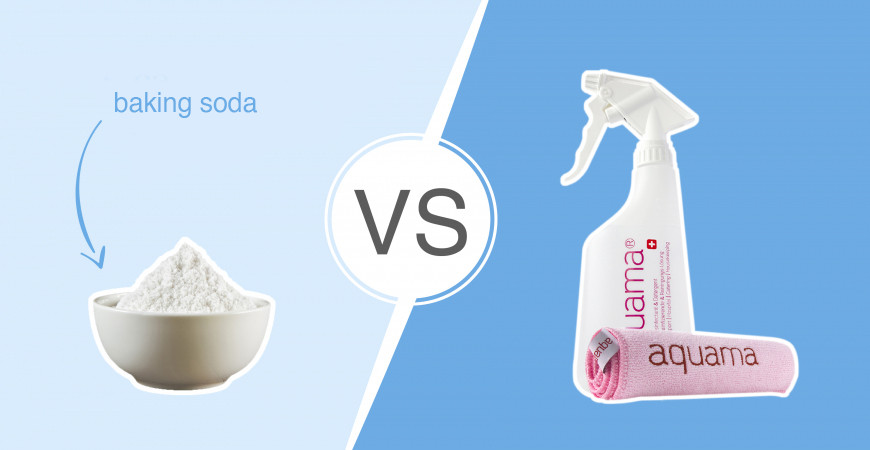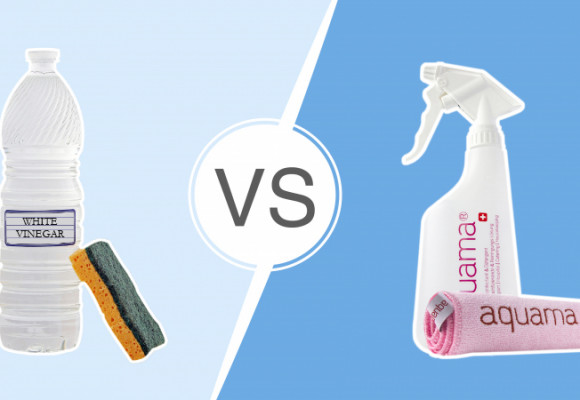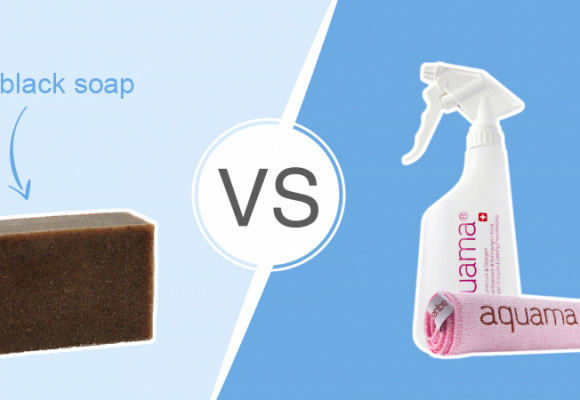Battle #1 - aquama vs baking soda
Battle #1 : aquama vs baking soda
Like white vinegar, baking soda (or sodium bicarbonate) is one of the tricks of grandmothers that are making a comeback. Its use dates back to ancient Egypt. It was then used as a hygiene product or as part of the mummification process. Then the Romans used it as a soap, medicinal remedy or to do laundry. Since then, its use has been extended to cooking and cleaning. Today, it has a reputation as a multi-purpose cleaner and deodorant.
Natural, ecological, economical, Baking soda seems to be the perfect cleaning product! But what are its limits and how does it compare to aquama®? The answer is in this article.
First of all, we have to distinguish between food baking soda and technical baking soda. The latter, safer, is specifically reserved for cleaning purposes. On the other hand, it has its drawbacks: it is less pure and less effective than food bicarbonate and its use requires rinsing in the event of contact with food.
Round 1 - The manufacturing process
aquama®: our cleaning solution is obtained from water and salt, thanks to a process of decomposition of water into oxygen and hydrogen via an electric current. aquama® has been designed to reduce the carbon footprint as much as possible. Indeed, our salt is certified of French origin and the solution is made directly at home to reduce logistics.
Sodium bicarbonate: sodium bicarbonate is mainly obtained by the Solvay process. The process uses pollutants that are difficult to remove, such as hydrochloric acid and calcium sulfide. In addition, the extraction, processing and transportation of raw materials as part of this process generate high carbon emissions.
Result: aquama® 1 - baking soda 0
Round 2 - Corrosivity
aquama®: our Indigo solution has a pH greater than or equal to 8.5. It is therefore alkaline and can be used safely on all surfaces of your home! In short, everything that supports water supports aquama®.
Sodium bicarbonate: the use of baking soda requires some caution, especially on certain surfaces such as stainless steel, aluminum or chromium. Indeed, the grains of bicarbonate can cause micro-scratches if it is not well diluted or used properly. It can also stain aluminum supports. Likewise, it is not compatible with silk or wool, as it may damage the fibers of the fabric.
Result: aquama® 2 - baking soda 0
Round 3 - What about bacteria?
aquama®: our solution meets European bactericidal, fungicidal and virucidal standards (EN1276, EN13697, EN1650 and EN14476). In addition to detergent and degreasing properties, it allows you to get rid of bacteria, bacilli, salmonella, legionella and mold.
Sodium bicarbonate: Contrary to popular belief, bicarbonate is not recognized as a disinfectant and even less as a bactericide. It is important to make the distinction between a bactericide and a bacteriostatic. Bicarbonate has bacteriostatic properties. This means that it prevents the development of bacteria but does not eliminate them.
Result: aquama® 3 - baking soda 0
Round 4 - Toxicity
Sodium bicarbonate: on technical baking soda packaging, you will often find the words "keep out of reach of children", "avoid contact with eyes" or even "toxic in the event of massive ingestion". The use of such a product therefore requires a certain vigilance. In addition, it is not recommended to mix baking soda with certain substances, such as white vinegar. This mixture generates an effervescent reaction capable of causing an explosion if it is carried out in a closed container. In addition, mixing these two ingredients is ineffective because their properties cancel each other out.
aquama®: on our sprays, on the other hand, you will not find any mention or pictogram of toxicity. Non-chemical and non-toxic, aquama® can be used safely by adults and children. Our solution has been subjected to numerous laboratory tests, which have proven to be harmless in case of skin and eye contact, inhalation or ingestion.
Result: aquama® 4 - baking soda 0
Round 5 - The price
Again, the benefit goes to aquama®. On average, 100 grams of bicarbonate costs 0.86 cents. As a reminder, our solution costs you 39 cents per liter (excluding the cost of the machine), which is 2 times cheaper!
Result: aquama® 5 - baking soda 0
Round 6 - Efficiency on the laundry
Sodium bicarbonate: baking soda, however, has its advantage: it can be used as a substitute for laundry or to strengthen its action. It is particularly effective in bleaching laundry, softening it and detaching it. However, be careful not to apply it on woolen or silk clothing.
aquama®: to date, our solution cannot be used as detergent yet, but our teams are continuously working on this. Nevertheless, aquama® has already demonstrated its effectiveness on stains of plum and engine grease on clothing!
Result: aquama® 5 - baking soda 1
Once again, victory is for aquama®! Do not hesitate to share your opinion in the comments and do suggest other comparisons for the next battles! :)




